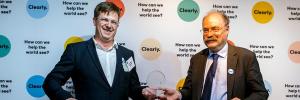
Vula App scoops (another) prestigious award
With over 2,5 billion people globally who are visually impaired and without readily available access to treatment, helping the whole world see in the next 20 years is no small goal. That is, however, exactly what Clearly, an international eye care initiative founded by Hong Kong-based social entrepreneur and philanthropist, James Chen, is setting out to achieve. The Clearly Vision Prize recently awarded $200 000 to winners of their ideas competition, targeted at funding outstanding innovations in the field of eye care.
Entries from around the world were evaluated, but on 12 October it was Stellenbosch University (SU)'s visionary, Dr William Mapham, who walked away with the first prize in this prestigious competition with the Vula mobile app.
Mapham, an ophthalmology registrar at SU's Faculty of Medicine and Health Sciences (FMHS), says the win has already generated publicity in international media, such as WIRED and Newsweek, as well as interest from investors. "However, it's only worth something if there are results to back it up," he says modestly.
"We'll use the prize money ($100 000) to continue growing and increasing our impact on rural healthcare."
Vula is an app that enables primary healthcare workers to capture photos and clinical data on a smartphone to send off to an on-call healthcare professional for expert advice or referral. Mapham's brainchild was born out of frustration with the lack of specialist healthcare professionals in remote rural areas. He wanted to figure out a way to connect the primary care workers to off-site specialists.
"The direct connection enables the detection of eye health conditions, case-by-case training and data analytics to help structure health care systems," he explains.
With Vula's launch in 2014, they initially targeted only ophthalmology referrals. It has, however, expanded into cardiology, orthopaedics, burns, dermatology and neurosurgery referrals since April 2016.
Vula won ahead of four other finalists that, according to Chen, were all "brilliant breakthrough innovations that have the potential to revolutionise how we detect, deliver and supply eye care across the world."
An instrument to test eyesight (a phoropter), made in Origami style, won second prize.
Mapham says that he thinks the judges had tough decisions to make. "The other finalists were incredible. I guess they saw Vula as having the potential to improve access to vision correction around the world."
For Mapham the highlight of the glamorous events evening, held in the cellar of a top restaurant in London, was being able to connect with like-minded talent, entrepreneurs and philanthropists.
Mapham attributes Vula's growth to its dynamic team, and commends COO Debbie Barret, legal and strategy head, Sara Hilliard Garrett, and Tiago Clemente Morgado, a former neurosurgery registrar, for their contributions.
He also thanks Prof David Meyer, Head of Ophthalmology at the FMHS, and the Tygerberg Hospital Management team for creating a culture of innovation. "In 2014 they granted me an unprecedented six months' unpaid sabbatical from my registrar time to focus on Vula," says Mapham. And it has paid off: the number of ophthalmology referrals to Tygerberg Hospital was reduced by 25% through case-by-case training of peripheral health care workers.
Mapham's vision for Vula is ambitious, yet simple: national expansion within South Africa from two provinces to all nine, African expansion starting in Namibia and Rwanda by the end of 2017, and a global network in five years' time.
Photo: The FMHS' Dr William Mapham (left) receives the Clearly Vision Prize
